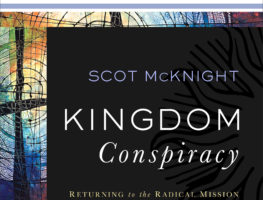On my last post on Scot McKnight’s Kingdom Conspiracy, I sketched out the boldest position of the book: “Kingdom” is always a people governed by a King (as the term is used consistently throughout the Old and New Testaments). Since the church is the people governed by King Jesus, the Kingdom of God is the church. The church, as grafted onto the people Israel, is the Kingdom now on its way to being consummated. This then leads to the most hotly contested (and I now think misunderstood) point of the whole book: there is no Kingdom outside the church. This has been so hotly contested that people are writing things about this position without even reading McKnight’s book (or any intention to do so). It’s got people upset. I must admit I’ve had my doubts? I’ve challenged him myself, even in public forums (whence came the loving dedication “For Fitch” I suspect). But now, after several conversations I wish to declare McKnight is on to something. But first, let me clear up something.
God’s Reign Outside the Church
There is obviously a wider reign of God at work in the world beyond the church. In the OT, repeatedly, we read, that God rules over the whole earth. The Psalms are full of these references. For instance, Ps 103:19 – “The Lord has established His throne in heaven, and His kingdom rules over all.” Ps 83:18 “Let them know that you, whose name is the LORD– that you alone are the Most High over all the earth.” The word “Lord” is OT language for the authority of sovereign reign of God. There are many times in the OT where God reigns through people outside the nation of Israel or the church. Cyrus for instance (Isaiah 45) is actually used by God to chastise Israel and guide Israel back to His purposes. We see this kind of stuff throughout the Old Testament.
When we get to the New Testament, we also see that Jesus Christ has been made “Lord” over the whole world. (in fact the Lordship Christology plays on the adonai theme from the OT). And so, in Matt 28 :18 Jesus announces upon his exaltation, “all authority has been given to me in heaven and on earth.” These words speak to the all encompassing reign and authority of the rule of Christ exalted to the right hand of the father. In the book of Revelation, we see Jesus, slain lamb of God, breaking the seals one by one, firmly in charge of the unfolding events of the world. In 1 Cor 15:25 we read the words “for He must reign until He has put all enemies beneath His feet.” So, its obvious, even beyond the church, where His reign is not yet recognized, Jesus is still Lord, reigning over all things, slowly and patiently bringing the whole world into reconciliation with God. God’s reign exists outside the nation of Israel and the church.
McKnight Remains Unfazed
McKnight does not deny this. Yet he remains unfazed. And so one day, a while ago, I had the realization, McKnight is making a distinction between the noun kingdom (and how it is used) and the various verbal cognates of reign (and how they are used of God and his sovereign rule over the whole world). “Kingdom,” the noun, refers to the specific visible spatial shape of God’s reign in the world. It is the geo-political manifestion of God’s work in the world through Jesus Christ. MCKNIGHT IS SAYING THAT THERE IS A BIG DIFFERENCE IN THE BIBLE BETWEEN USING THE WORD KINGDOM VERSUS USING THE WORDS REIGN AND RULE, AND SOVEREIGN LORDSHIP IN THE BIBLE.
AHAH!!!
Incidently, I pointed out to McKnight that Gerhard Von Rad’s article on greek word for “kingdom” (TDNT vol. 1 565-571) argues that initially the Kingship of Yahweh is restricted to Israel but in post-exilic times it takes on clear universalistic traits. McKnight responds by noting how the whole Kittel edited TDNT was a work of scholarship sponsored by the Nazi’s of Germany pre WW2. Its anti-Jewish Israel prejudice is therefore manifest in interpretations like this. (see Kingdom Conspiracy 225-228 for more stuff on this).
I believe this suddenly makes sense. I have for quite some time argued for the difference between the way God works for His mission broadly in the world (missio Dei) and the way God comes via the sending of His Son in the incarnation. The actual visible witness to what God is doing happens as this incarnate revelation in Christ becomes faithful into God’s mission/purposes before the whole world. This witness is extended via Christ’s presence (by the Holy Spirit) in a body of real people living under His lordship by the Spirit as His church. (the way I have framed this in Prodigal Christianity and now in a new book is “missio Dei + incarnation = witness”).
And so, I’m now on board with McKnight up to his point.
I believe this is encapsulated nicely in Eph1:22-23: “…and he has put all things under his feet and has made him the head over all things for the church.Which is his body, the fulness of him who fills all in all.” Here we see that while Jesus is Lord over the whole world, his fullness (I deal with this a little bit in End of Evangelicalism?) is manifest visibly in the church. The kingdom per se becomes located visibly in a people as a witness to the rest of the word where it is heading. This is what I take McKnight to be referring to in his argument that Kingdom (the noun) always refers to a visible people, a geo-political reality (I prefer a socio-political reality). As Oscar Cullman says in his old classic: “Thus the Church appears in reality as the centre of Christ’s Lordship over the whole world.” The Christology of the New Testament, p. 213.
Some people may worry about the church-world distinction being too hard. This structure contains a “we’re in – you’re out” mentality. Some may worry that this framework always puts the church in opposition against those outside of Christ.
But as Yoder (RYFC) and Hauerwas and others always teach, the distinction between the church and the world is not a spatial one, it is an eschatological one. God is sovereign ruling over the whole world. He is bringing the whole world to Himself patiently and graciously allowing freedom, indeed the painful unraveling of consequences, for the purpose that all the world may be redeemed. But the church is the place where He rules in most unfettered and clear terms. THE LINE BETWEEN THE CHURCH IN THE WORLD IS A LINE ONLY IN THAT IT MAKES VISIBLE IN TIME AND PLACE WHAT GOD IS DOING IN THE WHOLE WORLD AS A WITNESS!
Some Remaining Difference Between McKnight and Myself
McKnight and I have had many discussions/charitable disagreements together in the hall, at Missio Alliance, at Wheaton Theology Conference etc. (Here’s where the “For Fitch” dedication comes from. Check out the picture.). He many times comes back to me with the question that ends the book on page 255: “Did Gandhi do Kingdom work?” One time he asked me that question in a Q&A at Wheaton Theology conference and I replied “maybe.” McKnight would say “no way.” But I believe one way to look at Gandhi is to see God preveniently at work for His purposes, but that this work is incomplete, inchoate (and
may remain so). Nonetheless, it carries the seeds of penultimate work still to be completed in Christ Jesus in the church (the church redefined as God’s people). And so we can discern God at work in the world (missio Dei) in many works in the world, yet not complete to their rightful end in Christ (this is so different than sphere ideas of Kuyperian theology). Gandhi then could become Kingdom work (was MLK’s appropriation of Gandhi for the church’s movement for civil rights a completion of this work in Christ?). This does not mean, by the way, that Gandhi’s work will reach this end. It doesn’t mean that all good works are potentially Kingdom. And discerning that difference takes a community of Christ to discern by the Spirit in the fullness of Christ and bring Jesus as the completion of those works in the world in Christ – from which a community always forms.
For McKnight!
I do not know if McKnight would agree with my interpretation of him or God reigning in the world. Indeed, I still see where some people could think I’m saying something I’m not. But I feel McKnight’s work brings some new clarity to the line of thought I’ve been working with whether he knows it or not. I am writing a book entitled Faithful Presence (IVP-2015) which takes up these themes and fleshes them out in a daily practice for the church. I’m seriously thinking about dedicating it “For McKnight.”
In the meantime, with these added clarifications, can you now stand in the camp (with McKnight) of those who say “There is no Kingdom outside the church?” Why or Why not?
——————–
Looking to study these things in depth? With McKnight and other scholar practicioners? Check out the new M.A. in Theology and Mission at Northern Seminary.








Missio Alliance Comment Policy
The Missio Alliance Writing Collectives exist as a ministry of writing to resource theological practitioners for mission. From our Leading Voices to our regular Writing Team and those invited to publish with us as Community Voices, we are creating a space for thoughtful engagement of critical issues and questions facing the North American Church in God’s mission. This sort of thoughtful engagement is something that we seek to engender not only in our publishing, but in conversations that unfold as a result in the comment section of our articles.
Unfortunately, because of the relational distance introduced by online communication, “thoughtful engagement” and “comment sections” seldom go hand in hand. At the same time, censorship of comments by those who disagree with points made by authors, whose anger or limited perspective taints their words, or who simply feel the need to express their own opinion on a topic without any meaningful engagement with the article or comment in question can mask an important window into the true state of Christian discourse. As such, Missio Alliance sets forth the following suggestions for those who wish to engage in conversation around our writing:
1. Seek to understand the author’s intent.
If you disagree with something the an author said, consider framing your response as, “I hear you as saying _________. Am I understanding you correctly? If so, here’s why I disagree. _____________.
2. Seek to make your own voice heard.
We deeply desire and value the voice and perspective of our readers. However you may react to an article we publish or a fellow commenter, we encourage you to set forth that reaction is the most constructive way possible. Use your voice and perspective to move conversation forward rather than shut it down.
3. Share your story.
One of our favorite tenants is that “an enemy is someone whose story we haven’t heard.” Very often disagreements and rants are the result of people talking past rather than to one another. Everyone’s perspective is intimately bound up with their own stories – their contexts and experiences. We encourage you to couch your comments in whatever aspect of your own story might help others understand where you are coming from.
In view of those suggestions for shaping conversation on our site and in an effort to curate a hospitable space of open conversation, Missio Alliance may delete comments and/or ban users who show no regard for constructive engagement, especially those whose comments are easily construed as trolling, threatening, or abusive.